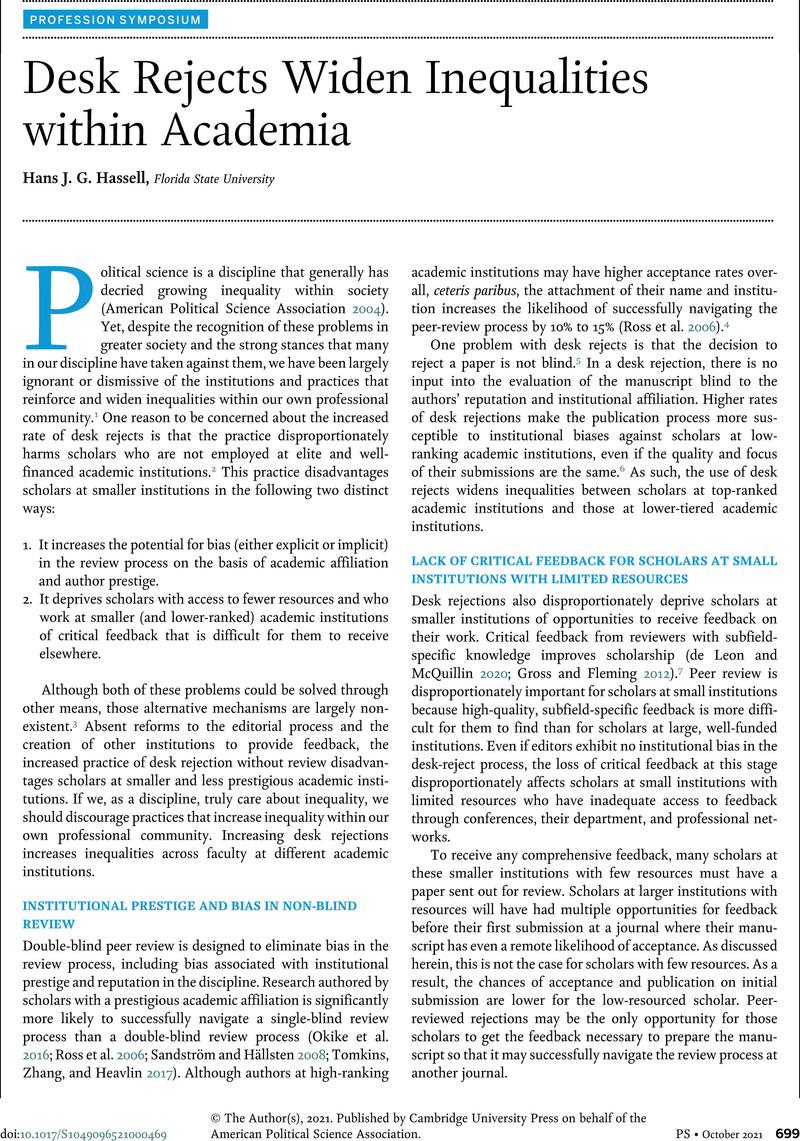No CrossRef data available.
Article contents
Desk Rejects Widen Inequalities within Academia
Published online by Cambridge University Press: 06 July 2021
Abstract
An abstract is not available for this content so a preview has been provided. Please use the Get access link above for information on how to access this content.

- Type
- Symposium on Desk Rejections
- Information
- Copyright
- © The Author(s), 2021. Published by Cambridge University Press on behalf of the American Political Science Association
References
REFERENCES
American Journal of Political Science
. 2020. “Invitation to Review MS for the AJPS.” Email to the author.Google Scholar
American Political Science Association. 2004. “American Democracy in an Age of Rising Inequality.” Task Force on Inequality and American Democracy. Washington, DC: American Political Science Association.Google Scholar
Campos, Raquel, de Leon, Fernanda, and McQuillin, Ben. 2018. “Lost in the Storm: The Academic Collaborations That Went Missing in Hurricane Issac.” Economic Journal 128 (610): 995–1018.CrossRefGoogle Scholar
Clauset, Aaron, Arbesman, Samuel, and Larremore, Daniel B.. 2015. “Systematic Inequality and Hierarchy in Faculty Hiring Networks.” Science Advances 1 (1): e1400005.CrossRefGoogle ScholarPubMed
Leon, de, Lopez, Fernanda Leite, and McQuillin, Ben. 2020. “The Role of Conferences on the Pathway to Academic Impact.” Journal of Human Resources 55 (1): 164–93.Google Scholar
Fölster, Stefan. 1995. “The Perils of Peer Review in Economics and Other Sciences.” Journal of Evolutionary Economics 5 (1): 43–57.CrossRefGoogle Scholar
Gross, Neil, and Fleming, Crystal. 2012. “Academic Conferences and the Making of Philosophical Knowledge.” In Social Knowledge in the Making, ed. Camic, Charles, Gross, Neil, and Lamont, Michele, 151–75. Chicago: University of Chicago Press.Google Scholar
Hadavand, Aboozar, Hamermesh, Daniel, and Wilson, Wesley. 2020. “Is Scholarly Refereeing Productive (at the Margin)?” Cambridge, MA: National Bureau of Economic Research Working Paper Series 26614.Google Scholar
Goues, Le, Claire, Yuriy Brun, Apel, Sven, Berger, Emery, Khurshid, Sarfraz, and Smaragdakis, Yannis. 2018. “Effectiveness of Anonymization in Double-Blind Review.” Communications of the ACM 61 (6): 30–33.CrossRefGoogle Scholar
Leeper, Thomas J. 2016. “Introducing #BeReviewer1: A Hashtag on a Mission.” https://thomasleeper.com/2016/08/be-reviewer-one.Google Scholar
Okike, Kanu, Hug, Kevin T., Kocher, Mininder S., and Leopold, Seth S.. 2016. “Single-Blind vs. Double-Blind Peer Review in the Setting of Author Prestige.” Journal of the American Medical Association 316 (12): 1315–16.CrossRefGoogle ScholarPubMed
Peters, Douglas P., and Ceci, Stephen J.. 1982. “Peer-Review Practices of Psychological Journals: The Fate of Published Articles, Submitted Again.” Behavioral and Brain Sciences 5 (2): 187–255.CrossRefGoogle Scholar
Ross, Joseph S., Gross, Cary P., Desai, Mayur M., Grant, Augustus O., Daniels, Stephen R., Hachinski, Vladimir C., Gibbons, Raymond J., Gardner, Timothy J., and Krumholz, Harlan M.. 2006. “Effect of Blinded Peer Review on Abstract Acceptance.” Journal of the American Medical Association 295 (14): 1675–80.CrossRefGoogle ScholarPubMed
Sandström, Ulf, and Hällsten, Martin. 2008. “Persistent Nepotism in Peer Review.” Scientometrics 74 (2): 175–89.CrossRefGoogle Scholar
Tomkins, Andrew, Zhang, Min, and Heavlin, William D.. 2017. “Reviewer Bias in Single- Versus Double-Blind Peer Review.” Proceedings of the National Academy of Sciences 114 (48): 12708–13.CrossRefGoogle ScholarPubMed
Vogel, Gretchen. 2011. “Open Access Gains Support; Fees and Journal Quality Deter Submissions.” Science 331 (6015): 273.CrossRefGoogle ScholarPubMed




